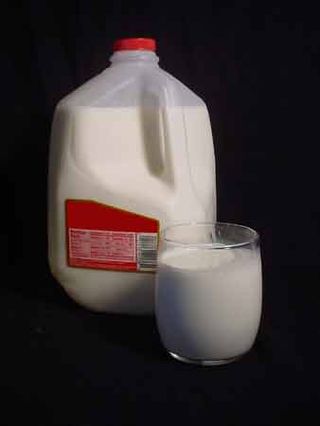Dairy Compound May Lower Risk of Type 2 Diabetes

A compound in dairy fat could decrease the risk of developing Type 2 diabetes, according to a new study.
People who consumed the highest levels of dairy a day — one to one-and-a-half servings of whole milk, 2 percent milk, cheese or butter — had a 60 percent lower risk of developing Type 2 diabetes than people who ate the lowest amounts of dairy, researchers said.
The compound, called trans-palmitoleic acid, promotes healthy levels of blood cholesterol, normal insulin levels and increased insulin sensitivity, said study researcher Dr. Dariush Mozaffarian, assistant professor of medicine at Harvard Medical School.
"These findings do suggest that we should think of dairy as more than a carrier of calcium and vitamin D," Mozaffarian told MyHealthNewsDaily.
The finding is based on 20 years of health data from 3,736 people who participated in the Cardiovascular Health Study, funded by the National Heart, Lung, and Blood Institute.
Although they, too, have the word "trans" in their name, trans-palmitoleic acids are not the same as the bad kinds of trans fats that can increase heart disease risk, Mozaffarian said. Trans-palmitoleic acids are found only in dairy products, whereas bad trans fats tend to come from industrially-produced partially hydrogenated vegetable oils.
The researchers said that trans-palmitoleic acids may decrease diabetes risk by mimicking the function of a related compound, called cis-palmitoleic acid, which is produced naturally in the liver.
Sign up for the Live Science daily newsletter now
Get the world’s most fascinating discoveries delivered straight to your inbox.
Thousands of years ago, cis-palmitoleic acid protected the body against high levels consumption of carbohydrates and calories during a meal, which were infrequent at the time. But modern diets are loaded with carbohydrates and calories, so cis-palmitoleic acid may no longer be able to counteract the metabolic consequences of such diets, Mozaffarian said.
"Trans-palmitoleic acid may be stepping in to function in at least some of the same protective roles," he said, though more tests need to be done to confirm this.
Previous studies have linked dairy consumption with low diabetes risk, though those studies were mostly based on low-fat dairy products. A 2006 study in the journal Diabetes Care found that eating an additional serving per day of low-fat dairy products decreased diabetes risk in women by 4 percent.
And a 2008 article in Diabetes Care found that the combination of whole grains, fruits, green leafy vegetables, nuts, seeds and dairy products can decrease the overall risk of diabetes by 15 percent.
The new study will be published tomorrow (Dec. 21) in the journal Annals of Internal Medicine.
Pass it on: Eating one to one-and-a-half servings of dairy a day is associated with a decreased risk of Type 2 diabetes.
- Best Bet for Weight Loss? A Protein-Rich Diet
- 9 Good Sources of Disease-Fighter Vitamin D
- Insulin Resistance: Risk Factor for Heart Disease and Diabetes
Follow MyHealthNewsDaily staff writer Amanda Chan on Twitter @AmandaLChan.
This article was provided by MyHealthNewsDaily, a sister site to LiveScience.
Most Popular


